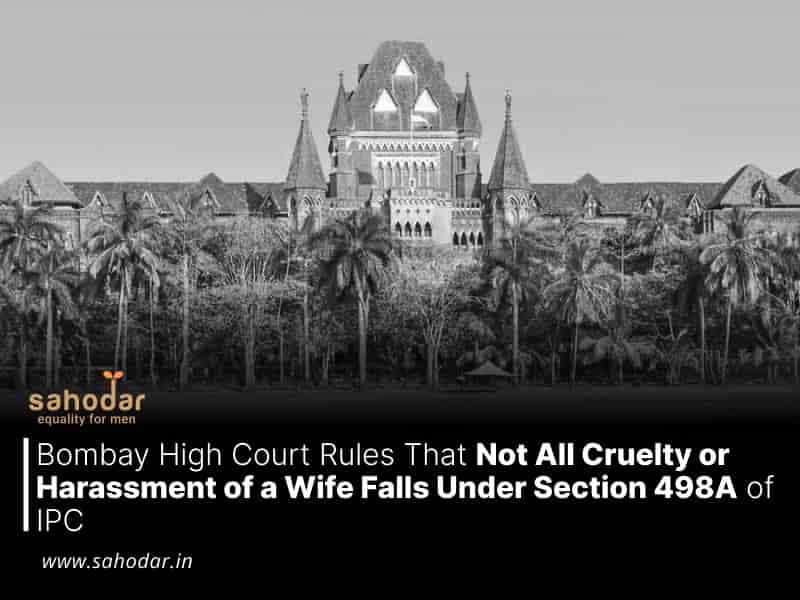On Monday, September 23, the Bombay High Court acquitted a husband who had been convicted of abetting his wife’s suicide through torture, stating that Section 498A of the Indian Penal Code (IPC) does not apply to every instance of harassment or cruelty.
Justice Sanjay Mehare, serving as a single judge in Aurangabad, emphasized that to secure a conviction under Section 498A, the prosecution must demonstrate evidence of ‘continuous’ harassment.
“Section 498A of the IPC does not attract every harassment or every type of cruelty. The prosecution has to establish that the beating and harassment of the deceased were with a view to force her to commit suicide or to fulfil the illegal demand of dowry. Mere harassment for dowry or causing grave injury to her life or limb or health is not cruelty, as explained in Section 498-A of IPC. To constitute the offence under this Section, it is to be established that the harassment was caused by coercing the woman to meet unlawful demands. To hold the accused guilty for the offence punishable under Section 498A of the IPC, there should be a case of continuous state of affairs of torture by one to another,” the judge said.
The allegations in this case indicated that the accused husband inflicted cruelty on his deceased wife through repeated demands for money to purchase gold ornaments. She experienced both physical and mental abuse, as her parents were unable to meet the accused’s financial demands due to their poor circumstances. The prosecution’s case showed that the husband would go to retrieve her when she stayed with her parents, assuring her that he would not mistreat her, which led her to return and live with him.
The bench noted that there was no cogent and reliable evidence of her last visit to her parents.
“The record reveals that there was no continuous state of affairs of torture by the husband to the deceased wife. It has been established that her parents-in-law were residing separately. The counsel for the petitioner succeeded in pointing out that there was no sufficient evidence to establish that the petitioner/accused willfully drove the deceased by his conduct to commit suicide nor the harassment as alleged prove that she was harassed with a view to coerce her or to her relatives to meet any unlawful demand of golden ornaments. There were general allegations of cruelty to the deceased or the demand for ornaments,” the judge noted.
The accused’s defense was that he did not permit her to visit her parents’ home with her brother. The judge observed that this explanation seems plausible based on the evidence presented.
Consequently, the judge acquitted the husband of charges under Section 498A and Section 306 (abetment of suicide).
Background:
The bench was reviewing a criminal appeal filed by a man contesting his conviction under Sections 498A and 306 of the IPC by a court in Aurangabad on April 28, 2004.
According to the prosecution, the accused husband harassed his wife by demanding gold jewelry from her parents, and when she was unable to meet those demands, he subjected her to physical and mental abuse. The accused, however, argued that his wife took the drastic step of ending her life due to her ‘depression’ over not being able to conceive. He further asserted that on the day of her suicide, she wanted to visit her parental home with her brother, but he did not allow her to go, which led her to consume pesticide to end her life.
The bench observed that the woman passed away within two years of her marriage. It noted that she had spent a considerable amount of time living with her parents, claiming that her husband was demanding gold ornaments. She eventually returned to live with him after he went to retrieve her, having allegedly assured her parents that he would not mistreat her.
The judges pointed out that the allegations made by the wife’s parents against the husband were quite vague and generalized, which was insufficient to establish his guilt.

